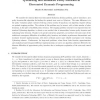Free Online Productivity Tools
i2Speak
i2Symbol
i2OCR
iTex2Img
iWeb2Print
iWeb2Shot
i2Type
iPdf2Split
iPdf2Merge
i2Bopomofo
i2Arabic
i2Style
i2Image
i2PDF
iLatex2Rtf
Sci2ools
CDC
2010
IEEE
2010
IEEE
Q-learning and enhanced policy iteration in discounted dynamic programming
We consider the classical finite-state discounted Markovian decision problem, and we introduce a new policy iteration-like algorithm for finding the optimal state costs or Q-factors. The main difference is in the policy evaluation phase: instead of solving a linear system of equations, our algorithm requires solving an optimal stopping problem. The solution of this problem may be inexact, with a finite number of value iterations, in the spirit of modified policy iteration. The stopping problem structure is incorporated into the standard Q-learning algorithm, to obtain a new method that is intermediate between policy iteration and Q-learning/value iteration. Thanks to its special contraction properties, our method overcomes some of the traditional convergence difficulties of modified policy iteration, and admits asynchronous deterministic and stochastic iterative implementations, with lower overhead and/or more reliable convergence over existing Q-learning schemes. Furthermore, for lar...
| Added | 13 May 2011 |
| Updated | 13 May 2011 |
| Type | Journal |
| Year | 2010 |
| Where | CDC |
| Authors | Dimitri P. Bertsekas, Huizhen Yu |
Comments (0)

